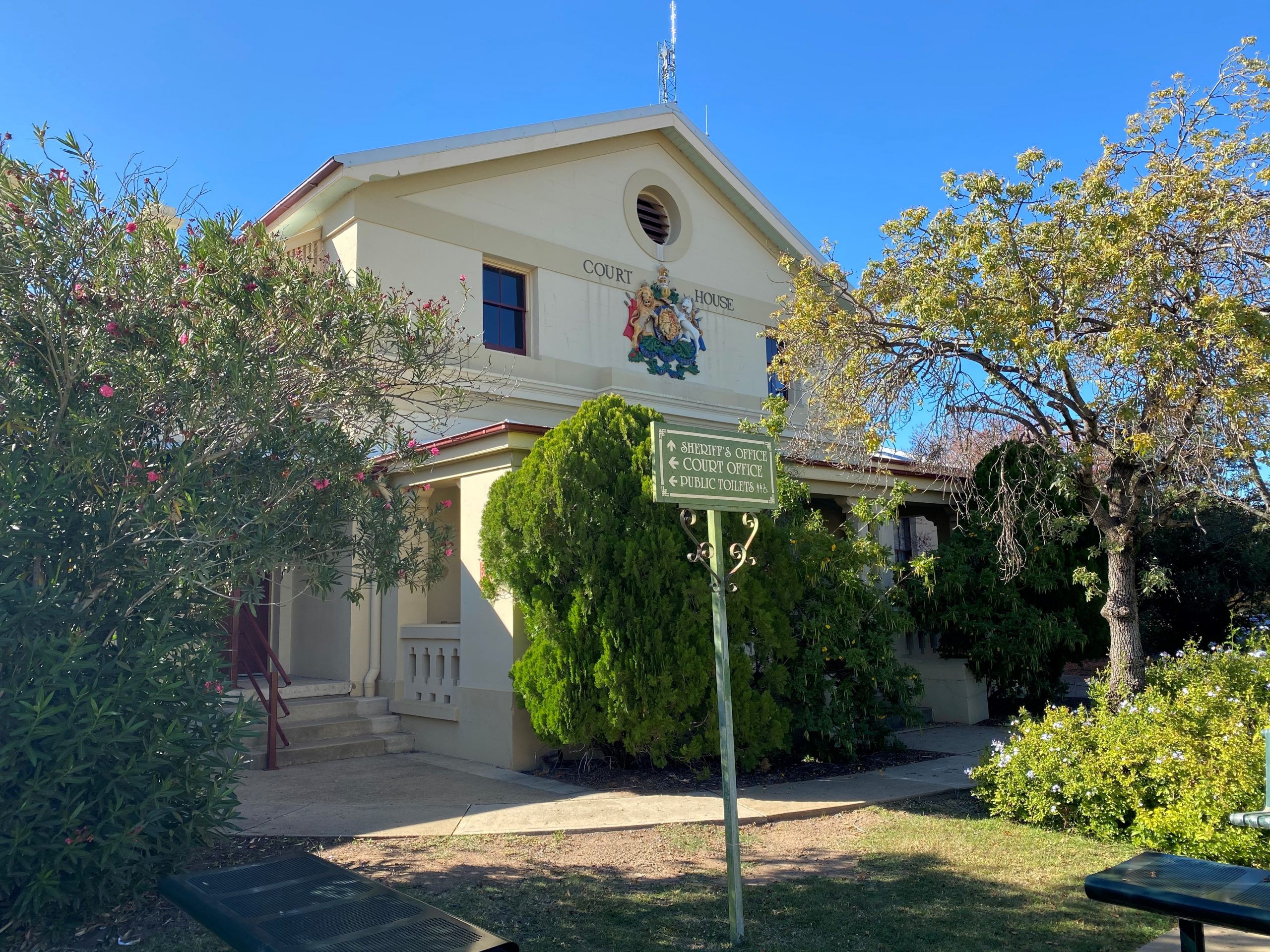Concerns have been raised about the impact of COVID-19 on the justice system and court process particularly the flow-on effects to victims.
“I think coronavirus is having a significant impact on the court system and victims,” said Kerrie Thompson, chief executive officer of the NSW Victim of Crimes Assistance League.
Courthouses in the district including Narrabri, Wee Waa and Moree are now open but were closed to the public for months when COVID-19 restrictions were put in place in March and there were operational changes.
Of course, the pandemic is an unprecedented situation and the restrictions are understandable, but nevertheless for some victims it has compounded their distress because matters have been delayed and accessing information has been a difficult and lengthy process.
“It can create a lot of frustration,” said Ms Thompson. “Victims have been told they can’t physically attend a matter and attending can be important for some.”
“Victims have been told they can’t physically attend a matter and attending can be important for some.
“And information isn’t being accessed easily.
“We understand that it’s an unusual space but these are real lives that have been damaged and the trauma is real.”
Ms Thompson said there has also been a “heightened sense of anxiety” created by a fear that offenders are going to be released from prison early or have their sentences reduced or influenced because of coronavirus.
Earlier this year, the ABC reported, a group of more than 370 lawyers, academics and advocates released an open letter calling on Australian governments to follow the lead of jurisdictions such as Ireland, the United States and the United Kingdom, where authorities have either released prisoners or flagged it as a possibility in response to the COVID-19 pandemic.
The letter stated that prisons could become coronavirus hotspots leading to inmate deaths, riots and further spread into the community.
“It’s been unsettling,” said Ms Thompson.
“There’s an expectation the legal system will hold offenders to account.”
A young man who attacked and robbed an elderly Narrabri woman in 2018 avoided being sent to jail when he was sentenced at Moree courthouse in April this year, shortly after COVID-19 restrictions were introduced.
He was handed a two-year intensive corrections order – which is a term of imprisonment that’s served out in the community rather than behind bars.
NSW District Court judge James Bennett SC noted a number of factors in his findings and did reference the risk of coronavirus.
“I bring to account in the modern era of recent development, the Coronavirus and the risk that all of us face as a consequence of this disease, which is causing such tragedy across the entire globe.
“It is recognised by the authorities, that people in custody are at risk and where possible steps have been taken to allow people to be released early to minimise the risk of transmission and infection.”
The offender, who can’t be named because he was a juvenile when he committed the crime, was convicted of the offence of aggravated robbery, causing grievous bodily harm and using corporal violence.
“If there is going to be a standard that courts are going to reduce sentencing or keep people out of jail because of COVID, it creates a real sense of injustice and it devalues the victim because there is an expectation that if a crime is committed then the offender should and will be held to account,” said Ms Thompson.
“He was a repeat offender, on parole, who attacked a vulnerable member of the community and it was an unprovoked attack – how much worse does it have to get?”
The victim of the crime was Narrabri’s Gwen Keft who was 86-years-old at the time of the attack, she is now 89 and her life has been changed forever.
The court’s punishment brings little comfort to Mrs Keft and her family who have had a tumultuous time.
“We are so disappointed with the judge’s decision,” said Mrs Keft’s daughter Robyn Collett.
“While walking down the street she lives in – my mother was followed, robbed and attacked, which resulted in a broken hip.
“My 89-year-old mother hasn’t been able to walk properly since the attack and has had her independence taken from her, while he walks free.”
The attack happened in broad daylight on the morning of March 10, 2018 when Mrs Keft was walking from her Narrabri home to the shops.
She was followed and then ‘violently’ attacked on Barwan Street just near the TAFE.
“The offender suddenly knocked her from behind,” according to court documents.
“She fell to the ground after striking the boundary fence erected around the TAFE. Her glasses were knocked from her head.
“She suffered pain in her right shoulder and her head from the fence, and forearm and leg where she struck the ground.
“He then took hold of her handbag and pulled on it with enough force that at the point where the shoulder strap attached to the back of her handbag it separated, causing the bag to come free from her body. He then fled.”
He was later arrested and charged. According to court documents, when the offender was interviewed by Juvenile Justice officers he had “a lack of memory of the event no doubt because of his ingestion of prohibited drugs; his motivation in those circumstances may be accepted to be the pursuit of money so that he could continue to use illicit substances.”
Court documents state that the offender was on parole when he attacked Mrs Keft and the judgement describes his “unenviable record of antecedents” that started with an appearance in the Children’s Court in 2015 for driving without a licence and engaging in a police pursuit, and continued to include offences such as stealing, property damage and assault.
In 2017, he was involved with the theft of an 85-year-old woman’s handbag and the aggravated robbery of a 28-year-old female university student.
In his findings judge Bennett stated: “He was subject to parole in the periods from 28 April 2017 to 27 May 2018, and also from 28 April 2017 to 27 October 2018, as a result of his successful appeals to the District Court in Armidale.
“One might wonder what was said on his behalf before the judge in Armidale, to persuade him to extend the leniency that was granted notwithstanding which he embarked upon the serious criminal behaviour that I am now to deal with.”
In her victim impact statement presented to the court, Mrs Keft explained the devastating impact his ‘serious criminal behaviour’ has had on her life.
“My life changed significantly,” she said.
“I was violently pushed and robbed which resulted in my hip being broken.
“Since the attack I have become socially withdrawn and have lost all my independence.
“I can no longer do the things I enjoyed.
“I rely on my daughter to assist me with daily life activities such as shopping and appointments.
“I am unable to walk to the shops, attend medical appointments, hair appointments, play lawn bowls, do my own gardening, go on bus trips, help deliver Meals on Wheels and socialise at the club like I used to.”
Mrs Keft explained that she still suffers from a lot of pain, has mobility issues and uses a ‘wheelie walker’ to help with her balance.
The now 89-year-old has been diagnosed with post-traumatic stress disorder and suffers from anxiety and insomnia.
“I still suffer nightmares and I have a fear of being in the vicinity where the assault took place.
“I was 86-years-old at the time of the assault and considered myself to be an active healthy, independent and social person for my age but that all changed the day I was assaulted.”
Mrs Keft’s handbag and some of its contents were returned to her but the offender took $300 and she has since faced many out-of-pocket expenses following the assault, more than $2000 worth.
Mrs Collett said they are very disheartened that the offender wasn’t put behind bars.
“The local police have been brilliant and have gone above and beyond to help, but we all feel we have been let down by the judicial system,” said Mrs Collett.
In his findings, the judge did reference a number of points regarding the offender not being sent to jail despite acknowledging “the clear anticipation that I was going to be incarcerating this young man.”
The judge stated that the offender had “made significant progress”.
“I note his youth.
“He has put before the Court, sufficient material to persuade me that he should have the opportunity to stay on the narrow path and continuing his evolution toward complete rehabilitation.”
To order photos from this page click here



